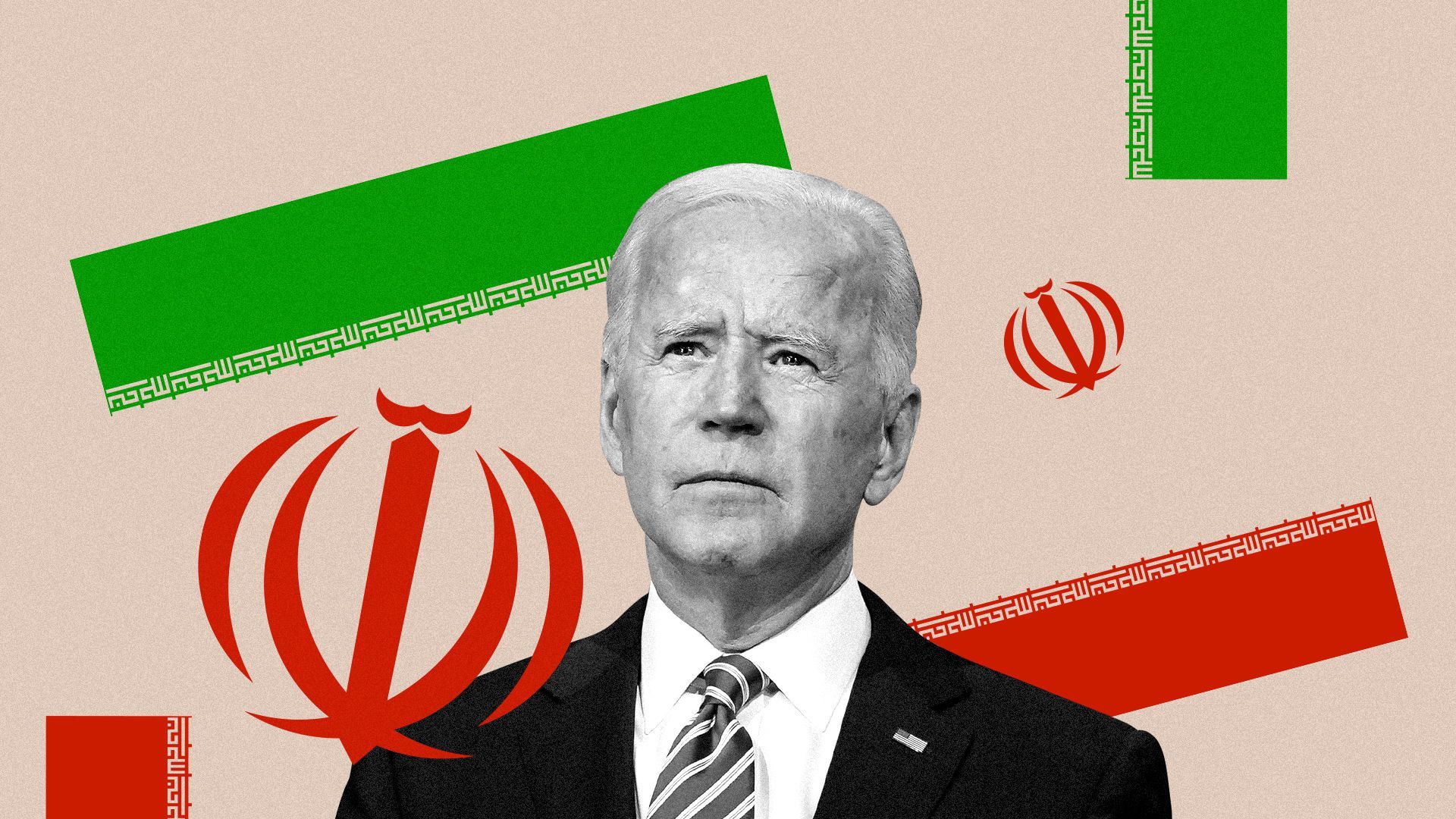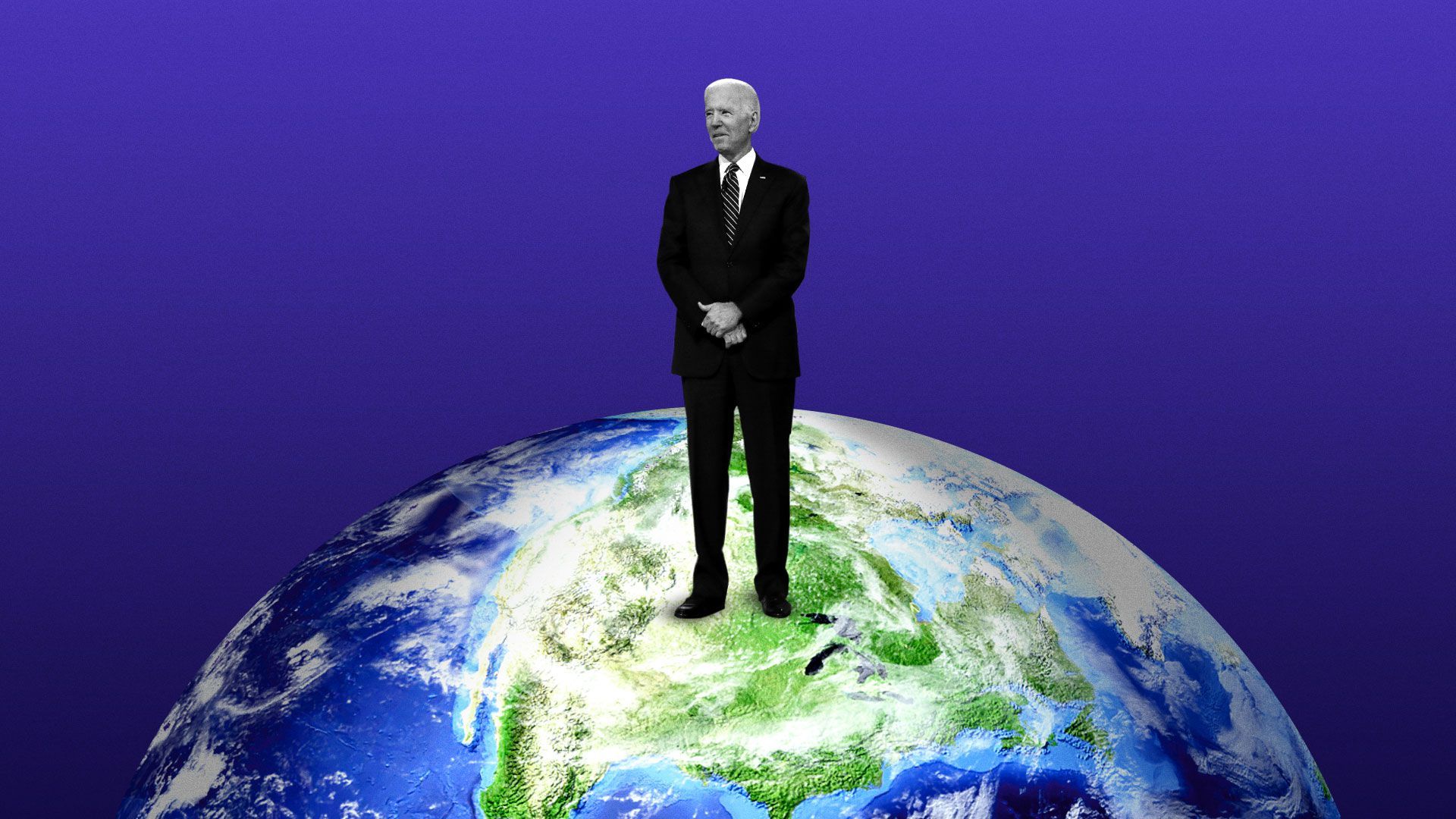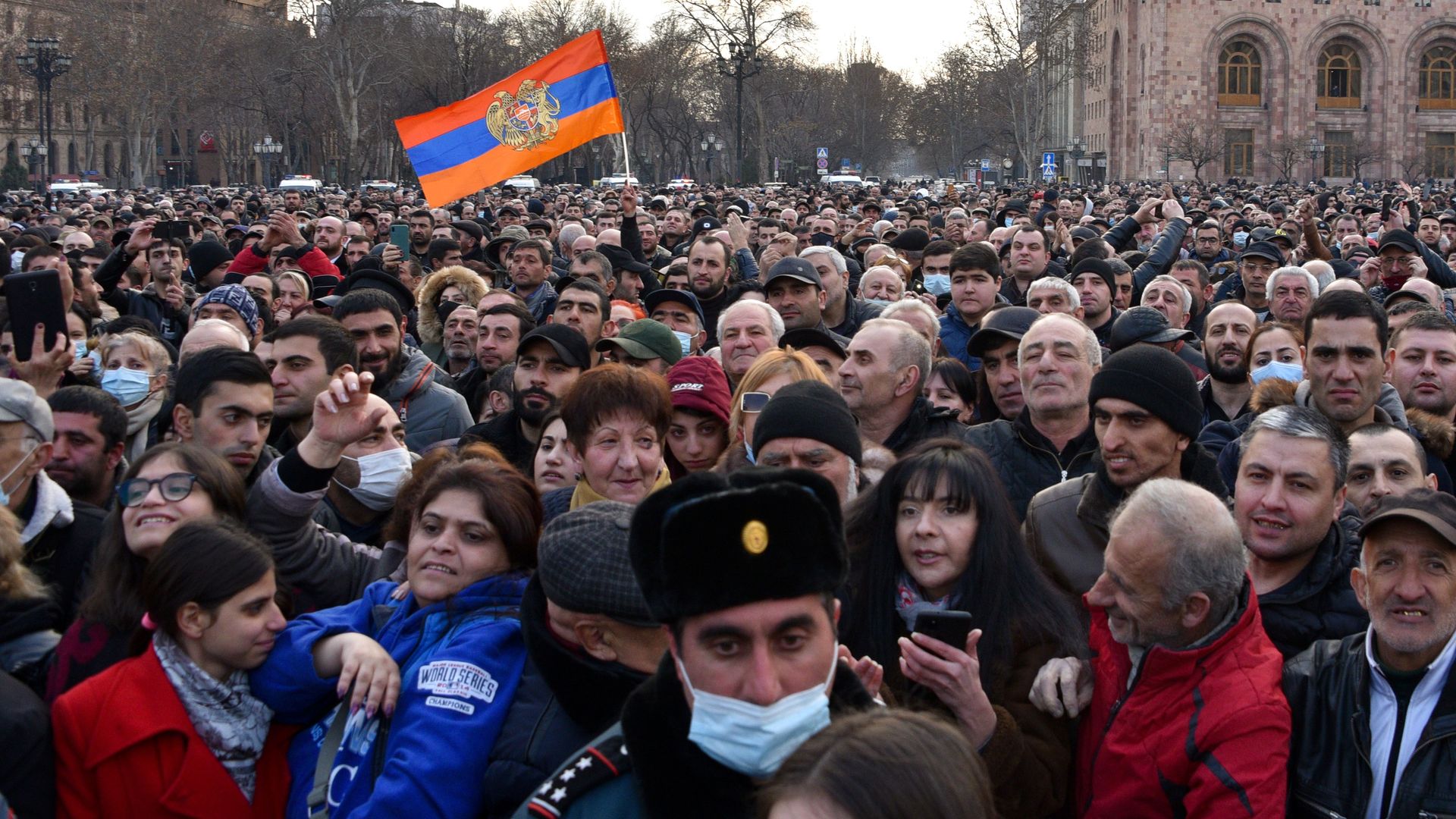| | | | | | | Presented By Raytheon Technologies | | | | Axios World | | By Dave Lawler ·Feb 25, 2021 | | Welcome back to Axios World. - Tonight's journey starts in Saudi Arabia, with stops in Iran, Armenia and the National Hockey League (1,547 words, 5 ½ minutes).
- New arrival? Sign up.
Situational awareness: The U.S. has carried out an airstrike against a structure belonging to an Iranian-backed militia in Syria in response to a series of rocket attacks against U.S. targets in Iraq, Reuters reports. | | | | | | 1 big thing: Biden's big Saudi reset |  | | | Mohammed bin Salman. Photo: Ryad Kramdi/AFP via Getty | | | | President Biden spoke with Saudi Arabia's King Salman this evening ahead of the release of a CIA report expected to implicate the king's son, and the kingdom's de facto ruler, in the murder of a U.S.-based journalist, Jamal Khashoggi. Why it matters: In one month, Biden has ended support for the Saudi war effort in Yemen, frozen a large arms deal and snubbed Crown Prince Mohammed bin Salman (MBS) by declining to speak with him directly. - The most dramatic step yet will be the publication of the Khashoggi report, expected tomorrow. Its release was mandated by Congress but blocked by Donald Trump.
- Sanctions are expected to follow on Saudis accused of taking part in the murder, though MBS is unlikely to be targeted directly.
- Between the lines: Biden's foreign policy has thus far featured more strategic reviews than bold strokes. But when it comes to Saudi Arabia — having promised on the campaign trail to "make them the pariah that they are" — Biden seems to be ripping the bandaid off all at once.
Flashback: Trump's first foreign trip was to Riyadh. His administration saw the kingdom as a key market for U.S. arms and a pivotal partner in countering Iran. - It shielded MBS, a close contact of Jared Kushner's, from the outrage in Washington over Khashoggi's murder.
- Clearly, times have changed.
"It's pretty dramatic," says David Rundell, a former U.S. chief of mission in Riyadh and the author of Vision or Mirage: Saudi Arabia at the Crossroads, of Biden's early steps. "To be honest, I find it all rather dangerous." - Rundell notes that in addition to cooperating with the U.S. against Iran and in counterterrorism, Saudi Arabia supports stability in oil markets and in the region through its aid to other Arab governments. The kingdom has also played a behind-the-scenes role in fostering relations between Israel and the Arab world.
- The kingdom does those things mainly out of self-interest, Rundell says. But they're also willing to hedge their bets.
- "What would really indicate to me that they had had enough? A significant increase in their relationship with either Russia or China."
The big picture: Biden's intention is not to sever the relationship but to bring it down to size. While the leaders of America's democratic allies are wrapped in an embrace, the impulsive crown prince is kept at arm's length. - Biden appears to have attempted to reassure King Salman in their call today.
- According to the White House readout, he noted the "historic nature" of the relationship, welcomed the recent release of jailed Saudi activists and pledged to help Saudi Arabia defend itself.
|     | | | | | | 2. How Iranians see the nuclear standoff with Biden |  | | | Photo illustration: Aïda Amer/Axios. Photo: Drew Angerer/Getty Images | | | | Most Iranians want to see the 2015 nuclear deal restored, but they also tend to support their government's efforts to play hardball on the issue, according to new polling from Maryland University's Center for International and Security Studies. The state of play: The Biden administration says it'll return the U.S. to the 2015 Joint Comprehensive Plan of Action (JCPOA) by lifting sanctions if Iran returns to compliance by reversing its recent nuclear steps. - The main sticking point is the sequencing of those moves. The U.S. offered last week to open direct talks to work through those issues, but Iran has not formally responded.
- Between the lines: Some in the Biden administration want to push for a broader and longer-lasting deal now — with Iran's regional behavior and its missile program on the table — but Biden's stated objective is to restore the 2015 deal and use it as a platform for further negotiations.
By the numbers: 51% of Iranians approve of the JCPOA, up from a low of 42% in 2019 but down from 76% in 2015. - But while 89% would support returning to the deal after the U.S. is back in compliance, just 32% think Iran should make the first move. Iranians are split down the middle over the most likely solution — a joint step-by-step approach.
- 73% support a recent law that calls for Iran to commit further breaches of the deal if the U.S. doesn't swiftly lift sanctions, while 69% oppose negotiations with the U.S. on other issues before the 2015 deal has been restored.
- 60% say it's unlikely the U.S. would live up to its obligations under the JCPOA even after returning to the deal, an indication of the deep distrust stoked by Donald Trump's withdrawal from the agreement in 2018.
Perhaps that explains why just 12% of Iranians would support holding immediate follow-on negotiations with the U.S. to build on the JCPOA, as Biden hopes to do. - 54% would support such negotiations, but only if the U.S. complies with the deal for a few years. 30% would never support future negotiations with the U.S.
- Iranians also overwhelmingly oppose the possibilities of extending the JCPOA's restrictions (60%) or making them permanent (72%), limiting the range of Iran's ballistic missiles (74%) or ending missile testing (83%).
|     | | | | | | 3. State of the outbreak: Four reasons for optimism |  | | | Illustration: Annelise Capossela/Axios | | | | 1. The global COVAX vaccine initiative is now off the ground, with the first shipments arriving in Ghana yesterday and Ivory Coast tomorrow. - 60 mainly low-income countries are set to receive the Oxford/AstraZeneca vaccine in the first phase of distribution.
2. Moderna is ready to begin testing a new vaccine designed to protect against the South African variant of COVID-19. Pfizer and Johnson & Johnson are conducting work along similar lines. - Quickly adapting existing vaccines to new variants could help subdue the virus in the longer term.
3. Johnson & Johnson's single-shot vaccine is 85% effective against severe to critical cases of COVID-19 and 66% effective overall, according to the FDA, which is expected to clear it for use in the U.S. within days. - The vaccine is cheap, can be kept at normal refrigerated temperatures, and is destined primarily for the developing world. COVAX has purchased 500 million doses, and the African Union has secured another 120 million.
4. Initial data from the vaccination campaign in the U.K. indicates, as expected, that those who are vaccinated are dramatically less likely to become infected with COVID-19 and far less likely to require hospitalization if they do. |     | | | | | | A message from Raytheon Technologies | | Raytheon Technologies is creating intelligent space technologies | | |  | | | | From missile warning to weather information, Raytheon Technologies is creating space-based technologies that are essential for global commerce, scientific discovery and national security. That's the future of aerospace and defense. Learn more at RTX.com. | | | | | | 4. Data du jour: What Americans want from Biden's foreign policy |  | | | Photo illustration: Eniola Odetunde/Axios. Photo: Spencer Platt/Getty Images | | | | Americans tend to think the top U.S. foreign policy priorities should include protecting American jobs, preventing terror attacks, reducing the spread of infectious diseases and stopping the spread of nuclear weapons, according to new data from the Pew Research Center. - There's a sharp partisan divide over whether limiting China's influence should be a top priority, with 63% of Republicans believing it should versus 36% of Democrats. Both numbers have risen significantly since 2018.
- The biggest partisan gaps come over dealing with climate change (Republicans 14%, Democrats 70%) and stopping illegal immigration (Republicans 64%, Democrats 16%).
- Neither party is particularly focused on promoting democracy (20% overall), aiding refugees (28%), reducing America's overseas military commitments (29%) or strengthening the UN (30%).
The big picture: 60% of Americans trust Biden to "do the right thing" in foreign policy, up from 47% under Donald Trump but down from Barack Obama's starting point of 74%. - 69% of Americans think other countries will view the U.S. more positively under Biden.
- Yes, but: Just 53% think he'll deal effectively with China, the lowest he scores on a specific foreign policy issue.
|     | | | | | | 5. Global news roundup: Flying the coup |  | | | Supporters of Pashinyan gather in Yerevan. Photo: Karen Minasyan/AFP via Getty | | | | 1. Armenian Prime Minister Nikol Pashinyan today accused the military of attempting to oust him in a coup. - After Pashinyan fired a top commander, the armed forces called on him to resign, and pro and anti-Pashinyan protesters gathered today in the capital, Yerevan.
- The backstory: The unrest follows a painful military defeat to neighboring Azerbaijan last fall that has severely weakened Pashinyan.
2. At least two people have been killed and 468 arrested during protests in Niger's capital, Niamey, after ruling party candidate Mohamed Bazoum was declared the winner of Sunday's presidential runoff. - What to watch: The impoverished and unstable West African country is on course for its first peaceful transfer of power, from Mahamadou Issoufou to his handpicked successor, Bazoum.
3. Facebook has banned Myanmar's military from the platform three weeks after a military coup. - Why it matters: Facebook is the front page of the internet for many in Myanmar. The military has used the platform for propaganda purposes both before and after the coup, including to demonize Myanmar's Rohingya minority.
4. India and Pakistan have reached the first cease-fire in 18 years to halt cross-border shelling in Kashmir. 5. Israel has reportedly offered vaccines to four countries — the Czech Republic, Hungary, Guatemala and Honduras — that have recently taken steps to recognize Israeli sovereignty in Jerusalem. - Between the lines: While small, the shipments total more doses than the 5,000 Israel has promised thus far for Palestinians living in the occupied territories, per the NYT.
6. A divorce court in Beijing has awarded a woman $7,700 for the unpaid housework and child care she performed over five years. - The low sum sparked backlash online, but the ruling sets an important precedent under China's new civil code, which takes unpaid labor into account in divorce cases, per the BBC.
7. Kids under 15 in the Philippines have been under orders to remain home at all times for nearly a year to slow the spread of COVID-19, the Economist notes. |     | | | | | | 6. World of sports |  | | | Photo: David Kirouac/Icon Sportswire via Getty Images | | | | Artemi Panarin is one of the world's best hockey players, and one of the few Russian sports stars with a history of publicly criticizing Vladimir Putin. Driving the news: Panarin is now taking a leave of absence from his team, the New York Rangers, after being accused by a former Russian league coach of beating up an 18-year-old woman in Latvia in 2011. The Rangers say the allegations, which Panarin denies, are "clearly an intimidation tactic." - The coach who made the allegations, former NHL player Andrei Nazarov, is an outspoken Putin supporter.
- Panarin had recently posted on Instagram in support of Alexei Navalny. Such statements set him apart from other famous Russian athletes, like fellow hockey star Alex Ovechkin, who have showed public support for Putin.
|     | | | | | | 7. Stories we're watching |  | | | A bomb disposal drill in Nanning, China. Photo: Yu Haiyang/VCG via Getty Images | | | - Biden signs order on semiconductor supply chains
- Senate confirms Thomas-Greenfield as UN ambassador
- U.S. will seek seat on UN Human Rights Council
- Biden in no rush to reverse Trump's move on Western Sahara
- U.S. and Israel to convene strategic forum on Iran
- Hong Kong activists face trial
- Allies worry Biden shaky on Putin's pipeline
Quoted: "A genocide on the Uyghur minority is occurring in China." — From a motion passed tonight by the Dutch parliament, following a similar vote in Canada's parliament on Monday |     | | | | | | A message from Raytheon Technologies | | Raytheon Technologies is creating intelligent space technologies | | |  | | | | From missile warning to weather information, Raytheon Technologies is creating space-based technologies that are essential for global commerce, scientific discovery and national security. That's the future of aerospace and defense. Learn more at RTX.com. | | | | | | Axios thanks our partners for supporting our newsletters.
Sponsorship has no influence on editorial content. Axios, 3100 Clarendon Blvd, Suite 1300, Arlington VA 22201 | | | You received this email because you signed up for newsletters from Axios.
Change your preferences or unsubscribe here. | | | Was this email forwarded to you?
Sign up now to get Axios in your inbox. | | | | Follow Axios on social media:    | | | | | |











No comments:
Post a Comment